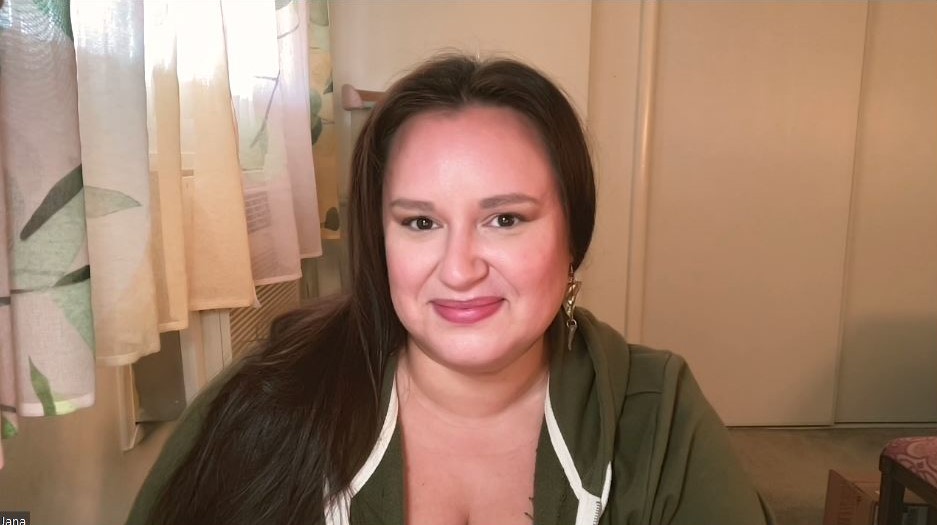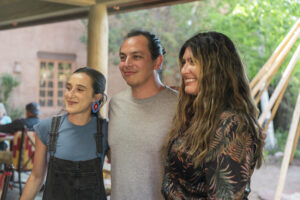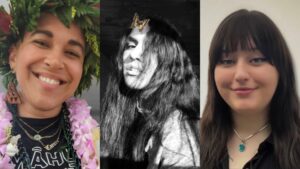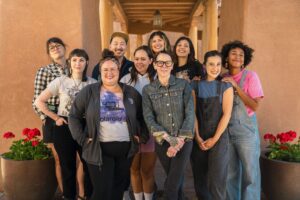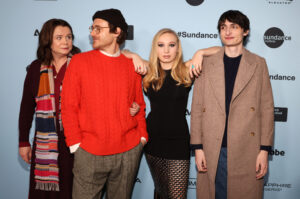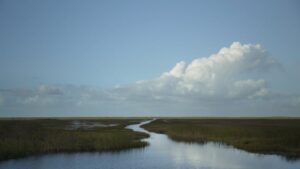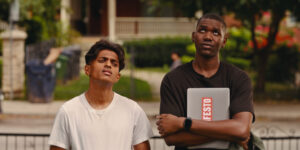by Ianeta Le’i
Sipping on a frothy homemade vanilla latte, Jana Schmieding is the kind of person you want as your best friend. It’s the same way I feel about Adele and Lily Gladstone — she’s authentic, hilarious, and extremely talented. You might recognize Schmieding as Reagan from Rutherford Falls, or Bev on Reservation Dogs, where she brings the same level of candor to our conversation about the state of Indigenous comedy within entertainment as she does to both shows.
The last time I saw Jana was this past May in Santa Fe, New Mexico, for our Sundance Institute Native Lab. She was an Indigenous Program Fellow working on her narrative feature project, Auntie Chuck. One of my favorite memories of that Lab was sitting around the dinner table, talking about things we shouldn’t talk about at the table, and reveling in total Aunty-ness as we devoured strawberry rhubarb pie. When the lab ended, I couldn’t wait to connect with her again.
In celebration of Native American Heritage month, I had the opportunity to sit down with the writer-actor via Zoom, and catch up on what she’s been up to, and get some insight to what makes her so damn funny.
So, Jana, where are you right now? What’s happening professionally.
The writer’s strike is over, thank god…and we got a great deal. Since that has completed, I have been pitching a TV show with Sierra Teller Ornelas that we co-created and co-wrote. I’m also in the process of diving back into my feature, and beginning development with that.
You mentioned you’re focusing on your feature, that’s the project you came to the Native Lab with, correct? Tell us a little bit about that project.
The project started with me and my little obsession with John Candy, and his movie Uncle Buck. I came away from Rutherford Falls and Reservation Dogs knowing that, in terms of being able to be in the movies or create broad comedies for Native people, I would have to be the one to start it.
I really feel like we deserve an opportunity to have our Chris Farleys, our Adam Sandlers, and Kristin Wiigs. I want to step into that role, so I was thinking, wouldn’t it be great to have an Uncle Buck — but like an Aunty Buck — and what would that look like? John Hughes has talked in interviews about creating Uncle Buck as a gift for his friend, John Candy, which I always thought was so special and sweet… So i went to work last year in August, writing my ideas down and going back and forth with them and talking with my producing partners on this project, who I’m developing this with (Ed Helms and Mike Falbo) — they’re a producing team called Pacific Electric — they were immediately interested and were like, “Yeah! we need more comedies.”
In this whole entire process of writing it, every exec and producer [agreed that] we need more comedies. There’s just not enough comedy features. I grew up in the ’80s and ’90s, where the comedy feature was the bread and butter of movies. There were always several you could go and see in the theater, [but now] it seems like nothing gets a theatrical release or streaming release if it’s a comedy, and I feel like it’s been relegated lately to a bit of a niche genre. It’s very weird.
I’ve been working on it and writing it, the process is completely different from TV. So I’ve also been learning what it looks like to develop a feature. I also went to the Sundance Native Lab, sat around with other natives, and punched it up there, which was extraordinarily helpful… And now that the strike is over, I can actually team up with my director, Tazbah Chavez. We’re in the process of getting our teams together and figuring out how to make it happen.
I remember when we first read your script, the way you described it is exactly how it happened, where our staff was so excited to read something hilarious. The cold read at Lab was such an amazing experience. Did you always know you wanted to do comedy? Did you grow up in a super funny family?
Yeah! Funny family, lots of goofballs in my family, and everyone had their own unique sense of humor. But I always gravitated toward comedy, I’m not really sure why. I was just always very attracted to friends and other women who were very funny. I’d invite my friends over and we’d make stupid videos and parody commercials with our old VHS camcorders and Hi8 recorders…I have stacks of like 5th grade sketch comedies that I’d been making—
I think for the purpose of this blog you’re gonna need to send us some links…
I don’t have them online [laughs]! I’ve just always been a fan of SNL, Mad TV… Early on, sketch comedy has been very influential to me; also sit-coms, and comedic movies and performers.
Tell me about the writers rooms that you’ve been in, and being able to be with other like minded actors, writers, and creatives.
I’ve only been in one room, and it was Rutherford Falls before I got staffed. I wrote on both seasons, and it was the joy of my life. That level of collaboration with the diversity of people is such a wonderful setting to get anything accomplished. I never want to work in a space where there aren’t other Natives there. We just speak a common language [and] have common experiences growing up, but unique in their own weird way.
Especially on Rutherford Falls, we have Taietsarón:sere Leclaire who’s Mohawk from the Northeast, we had Tazbah Chavez who is Paiute and Navajo, she’s from Southern California…Me, my people are from Cheyenne River in the plains, Bobby Wilson grew up also off of his homelands kind of, who is from the Twin Cities, Minnesota. Sierra is Navajo… [That show was] such an amazing collaboration — everyone is from everywhere, and we were all able to bring in so much. There are also non-native people, who are like “Oh yeah! There’s a version of that in our community, too,.” [Like] where there’s pressure to do and be good from your community, but you’re blowing it — there’s just all these unique experiences that I don’t think a lot of us have had the opportunity to commune about in a professional environment. It’s special.
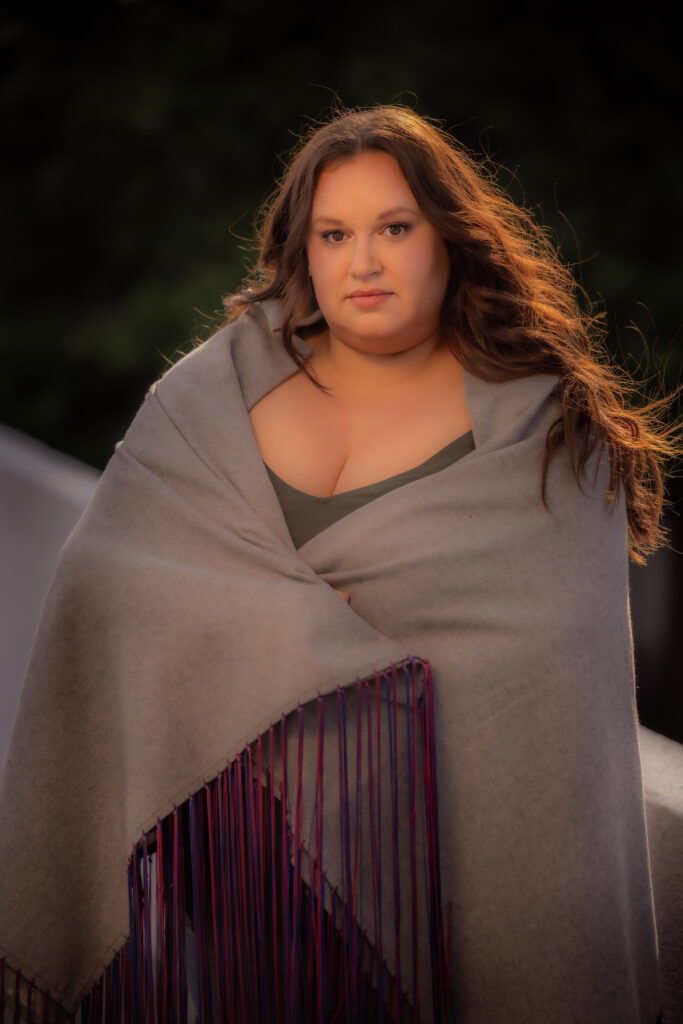
Tell me about the writers rooms that you’ve been in, and being able to be with other like minded actors, writers, and creatives.
I’ve only been in one room, and it was Rutherford Falls before I got staffed. I wrote on both seasons, and it was the joy of my life. That level of collaboration with the diversity of people is such a wonderful setting to get anything accomplished. I never want to work in a space where there aren’t other Natives there. We just speak a common language [and] have common experiences growing up, but unique in their own weird way.
Especially on Rutherford Falls, we have Taietsarón:sere Leclaire who’s Mohawk from the Northeast, we had Tazbah Chavez who is Paiute and Navajo, she’s from Southern California…Me, my people are from Cheyenne River in the plains, Bobby Wilson grew up also off of his homelands kind of, who is from the Twin Cities, Minnesota. Sierra is Navajo… [That show was] such an amazing collaboration — everyone is from everywhere, and we were all able to bring in so much. There are also non-native people, who are like “Oh yeah! There’s a version of that in our community, too,.” [Like] where there’s pressure to do and be good from your community, but you’re blowing it — there’s just all these unique experiences that I don’t think a lot of us have had the opportunity to commune about in a professional environment. It’s special.
Is there anything that you want to address or share about this month?
I just got back from a Native comic con in Tahlequah, Oklahoma —SkasdiCon as they call it — and it’s through the Cherokee Tribal office. It was really wonderful, but I was dreading it a little, because I’m a little social phobic, slightly…I live in LA and I don’t feel like I’m a big celebrity here, but if I go to an Indian casino or if I go to a Powwow or anywhere there’s a lot of Indians, boy I cannot walk two feet without getting stopped for pictures. And that’s a very intimidating feeling, [but at SkasdiCon] it was a wonderful feeling because the biggest group of people who really end up fawning over me were women. Women my age or older.
That means something. It means you’re connecting to your audience…
It means so much to me that that is my demo. Sometimes men would stop me and be like, ‘I loved you on Rez Dogs,’ and then they’ll be like ‘…also my wife made me watch Rutherford Falls and that was pretty good too.’ Like they don’t watch it unless their wives tell them too. It’s very interesting to see who appreciates the comedy, and it’s a lot of women.
I think for a long time in media and entertainment, Native women have really suffered from a lack of being seen as humorous. And we need it so bad.We forget how healing humor is, and it’s our time to really blow it up in this way, and be seen as the fully funny and compassionate, stressed out broads that we are.
Going to SkasdiCon was very special because it was a reminder…and it was just nice to be in community with Native people, and to have an appreciation for all of their costumes and nerding out about TV and film. That’s who I am. These are my people. [I was] delighted to be in the presence of people who really appreciate the art form, so much so that they’re recreating it — comic books and characters and making it their own — making it our own. Making it Native.
Jana Schmieding wrote on and co-starred in Rutherford Falls and is known for her comedic roles on Reservation Dogs, The Great North, and Spirit Rangers. A Lakota woman, Jana is making her mark on the entertainment industry as an actor, writer, and producer bringing Native stories to mainstream audiences.




